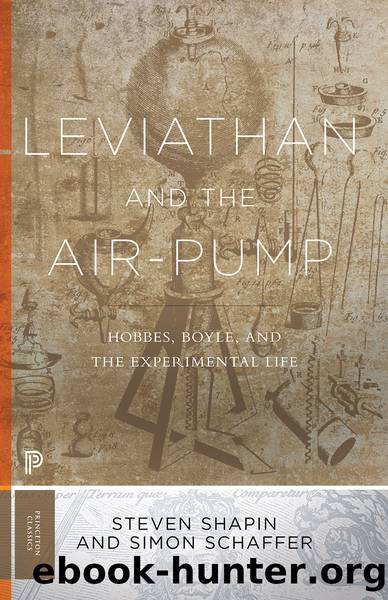Leviathan and the Air-Pump by Steven Shapin & Simon Schaffer

Author:Steven Shapin & Simon Schaffer
Language: eng
Format: epub
Publisher: Princeton University Press
Published: 2011-06-15T00:00:00+00:00
THE CONSTITUTION OF THE AIR
That the proper âway of discoursingâ in natural philosophy was a moral matter is easily seen. Moral considerations also informed Boyleâs conceptual and technical defence of the integrity of his pump. The moral threat posed by Hobbes to the community of natural philosophers consisted, on the one hand, of his violations of the rules and conventions of experimental discourse: his âdogmaticâ way threatened to sow seeds of divisiveness in the garden of experimental harmony. But the particular nature of his criticisms also sinned against the boundary conditions laid down by experimental philosophers. By violating the boundaries between âphysiologyâ and âmetaphysics,â between âmatters of factâ and causal items, Hobbes threatened to destroy the classifications that permitted amicable discourse and that generated uncoerced assent. Nowhere are these interconnections between the conceptual, the technical, and the moral more visible than in Boyleâs treatment of the constitution of the air, as this related to specific experimental performances and Hobbesâs criticisms thereof. Hobbes had to be put right on two heads: first, he had attacked Boyle as a vacuist when Boyle had declared no position on this âmetaphysicalâ matter;60 second, he had deployed notions of the constitution of the air which were themselves either âmetaphysicalâ or manifestly erroneous.61 In either case, Hobbesâs claims about the make-up of the air were specifically addressed to that most important issue: the physical integrity of the air-pump and the legitimacy of its findings. Boyleâs treatment of these criticisms took both a programmatic and an experimental form.
Hobbes had argued that Boyleâs machine produced no vacuum. We have already given an account of the technical response that Boyle made: he had designed a modified version of the air-pump that was arguably less likely to leak with respect to atmospheric air.62 However, Boyle recognized that a decisive defence against Hobbes would involve him in a more explicit discussion of the constitution of the air than he had previously provided. There are two points to be made in this connection: first, that Boyleâs treatment of the airâs constitution in those texts was always addressed to the specific question of the physical integrity of the air-pump and the manner in which Hobbes had impugned that integrity; second, that Boyle offered a variety of versions of Hobbesâs claims about the constitution of the air. The refutation of each of these versions allowed Boyle to defend the pump and the legitimacy of its experimental products in different and in equally important ways.
Boyle said that Hobbes had been âunclearâ in his statements about the constitution of the air. But Hobbesâs fundamental contention in the Dialogus physicus had been this: the atmosphere consisted of a mixture of terrestrial particles, which possessed a âcongenitalâ simple circular motion, and of a pure air (aer purus), sometimes compared with an âaethereal body.â The former fraction mechanically performed the functions which Boyle attributed to spring; the latter fraction filled the space in the receiver at all times. The subtler and purer fractions of air were still air, and so the receiver could never legitimately be said to be empty.
Download
This site does not store any files on its server. We only index and link to content provided by other sites. Please contact the content providers to delete copyright contents if any and email us, we'll remove relevant links or contents immediately.
Asking the Right Questions: A Guide to Critical Thinking by M. Neil Browne & Stuart M. Keeley(5762)
Autoboyography by Christina Lauren(5228)
Eat That Frog! by Brian Tracy(4526)
Dialogue by Robert McKee(4389)
Sticky Fingers by Joe Hagan(4188)
Journeys Out of the Body by Robert Monroe(3619)
Annapurna by Maurice Herzog(3464)
Full Circle by Michael Palin(3443)
Schaum's Quick Guide to Writing Great Short Stories by Margaret Lucke(3376)
Elements of Style 2017 by Richard De A'Morelli(3343)
The Art of Dramatic Writing: Its Basis in the Creative Interpretation of Human Motives by Egri Lajos(3062)
Atlas Obscura by Joshua Foer(2955)
Why I Write by George Orwell(2945)
The Fight by Norman Mailer(2930)
The Diviners by Libba Bray(2927)
In Patagonia by Bruce Chatwin(2922)
The Mental Game of Writing: How to Overcome Obstacles, Stay Creative and Productive, and Free Your Mind for Success by James Scott Bell(2904)
Venice by Jan Morris(2568)
The Elements of Style by William Strunk and E. B. White(2470)
